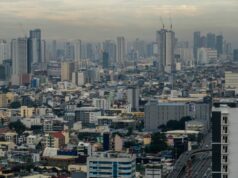Diokno says to ‘expedite’ RRR cut
MONETARY POLICY easing could well be on the horizon in the face of easing headline inflation, central bank officials signalled on Wednesday.
Bangko Sentral ng Pilipinas (BSP) Governor Benjamin E. Diokno said in his first briefing in that capacity that the central bank “can expedite the… reduction in the reserve requirement (ratio, or RRR)”, continuing the policy of the late Governor Nestor “Nesting” A. Espenilla, Jr., who died of tongue cancer on Feb. 23. “Policy ‘yun ni (That’s a policy of) Nesting. Mataas talaga ‘yun (The current RRR is really high),” Mr. Diokno said at the head office of the Department of Budget and Management (DBM) which he used to lead. “… [I]t’s a tax on banks. At saka ipahiram mo naman sa tao (the freed funds will be lent to the public anyway).”
From a global high of 20%, the central bank slashed the RRR in two moves last year and now requires universal and commercial banks to hold on to just 18% of deposits, leaving them with more or less an additional P200 billion that they can lend to borrowers. Mr. Espenilla’s long-term goal was to bring the bank reserve standard to single-digit level by 2023 or when his six-year term as central bank chief was to end.
“We’ll look at timing. Timing is important. Maganda naman ‘yung deceleration ng inflation (The deceleration of inflation looks good). Baka kailangan ng dalawa pang (It may need two more) points like in March and April before…” the new central bank chief added before he was interrupted.
Mr. Diokno said inflation could fall to two percent — the bottom of its 2-4%target range — as early as next quarter due to base effects. Inflation moved back within the BSP target in February, easing to a one-year low of 3.8%. That brought year-to-date inflation to 4.1%. “As you can see, inflation last month was [at] 3.8%. It breached all the consensus. It shows a declining pattern,” Mr Diokno said.
BSP Deputy Governor Chuchi G. Fonacier said separately in a speech that there appears to be bigger space for the central bank to consider tweaks to current benchmark rates, now that inflation has steadily declined from the nine-year peak of 6.7% in September and October 2018. “The recent decline in inflation pressures provides us more space to fully ascertain the impact of monetary adjustments on financial markets and the broader economy,” she said.
The central bank had to raise policy rates five times last year by total of 175 basis points (bp) in order to douse inflation expectations at a time of surging oil and food prices.
However, BSP Deputy Governor Diwa C. Guinigundo flagged on Tuesday that it might be “premature” to talk about policy cuts, given that the two-month inflation average is still beyond target at 4.1%.
Also yesterday, analysts at S&P Global Ratings said they believe the window has opened for the BSP to unwind last year’s tightening moves.
“What we think this year is that a lot of these factors on inflation have really died down. That will give the BSP some space to perhaps reduce some of the over-tightening that they were forced to do last year,” Vincent R. Conti, Asia-Pacific economist at S&P, said in a webcast.
However, Mr. Conti said policy cuts will be “pretty slow,” as the BSP will still have to contend with risks like sharp spikes in world crude prices and interest rate decisions from the United States Federal Reserve, which would affect domestic yields.
“With these inflation risks in the horizon, it will be quite prudent for the BSP to wait a little bit before deciding to reduce that over-tightening,” he added, noting that they also expect further cuts in the reserve requirement ratio for banks “over the course of a few years.”
These statements come at a time of market expectations of a more dovish Mr. Diokno, whom market players see as someone who will pursue “pro-growth” policies at the BSP’s helm by way of lower borrowing rates.
Mr. Diokno said he will pursue “steady, strong growth as a policy.”
In a statement, BSP Officer-in-Charge Ma. Almasara Cyd Tuaño-Amador said central bank staff welcome Mr. Diokno’s appointment and vowed to “work closely” with him. This comes amid previous calls to appoint a career official as the next governor, owing to tradition over the past decade.
Mr. Diokno will preside over his first Monetary Board meeting today, and will lead the next rate-setting meeting on March 21.
“The BSP, its mandate as you know, is price stability, the [regulation] of the banking system… We will continue all those,” he said yesterday.
Mr. Diokno added that the central bank will continue the financial inclusion thrust initiated by Mr. Espenilla and address cybersecurity issues, which he called the “number one threat to any financial system.”
Malacañang on Wednesday said there is no need for Mr. Diokno to go through the Commission on Appointments (CA).
“After further evaluation of relevant laws and jurisprudence surrounding the appointment of former Secretary of Budget and Management Benjamin E. Diokno as the new governor of the Bangko Sentral ng Pilipinas (BSP), it is the position of the Palace that the said appointment need not be confirmed by the Commission on Appointments (CA),” Presidential Spokesperson Salvador S. Panelo said in a statement, noting — among others — that the post of central bank chief is not among presidential appointments listed under Article VII, Section 16 of the 1987 Constitution that require CA nod.
Article II Secion 6(a) of Republic Act No. 7653, or The New Central Bank Act, however, provides that “[t]he Governor of the Bangko Sentral shall be head of a department and his appointment shall be subject to confirmation by the Commission on Appointments”.
Camarines Sur Rep. Rolando G. Andaya, Jr., who has questioned Mr. Diokno on the proposed P3.757-trillion 2019 national budget, said in a press conference at the House of Representatives on Wednesday: “Last time I checked, kailangan may CA. Pati members ng Monetary Board kailangan (the central bank governor and members of the Monetary Board need CA confirmation).”
Asked if CA members at the Senate will question Mr. Diokno’s appointment without the commission’s nod, CA Chairman and Senate President Vicente C. Sotto III replied in a mobile phone message: “Nope, there is already jurisprudence on the matter.”
Mr. Diokno, who was sworn into office by President Rodrigo R. Duterte last night, recalled that Finance Secretary Carlos G. Dominguez III, had asked him and Socioeconomic Planning Secretary Ernesto M. Pernia for recommendations on Mr. Espenilla’s successor.
“I said any of the DGs (BSP deputy governors) can be considered. Don’t appoint a banker,” Mr. Diokno said.
“He said ‘why not you?’ I said ‘why not?’”
Noting that financial markets hang on to the BSP’s chief every word, Mr. Diokno said he will now have to be “more careful” in his statements. “My statements have to be measured, the have to be circumspect, because every word that the BSP Governor moves the market.”
“I have to be that person. Not necessarily a monk, but I guess [I’ll be more] private than usual.” — Karl Angelo N. Vidal, Melissa Luz. T. Lopez and Arjay L. Balinbin with Reuters



